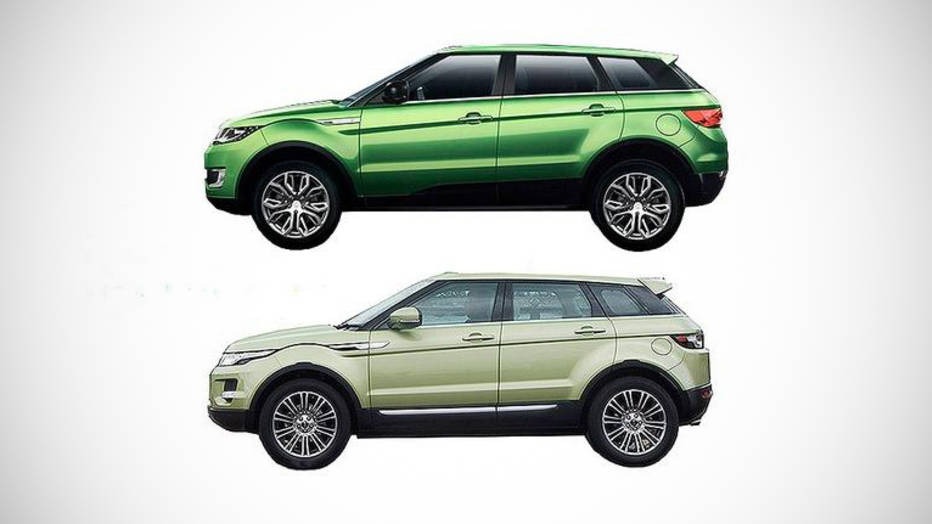Quilted handbags bearing golden-hued double “C” logos, knitted athletic sneakers with foamy soles and three parallel stripes on the side, and battery-bearing – not mechanical self-winding movements, and ticking – not gracefully gliding – watches bearing the Rolex name are some of the most frequently-produced fakes that leave the Chinese mainland each year en masse, destined for counterfeit-seeking consumers in the West.
Among these commonly-copied items, however, are bigger ticket ones, literally speaking, ones that do not tend to leave the country at all, and instead, are offered up to Chinese consumers. They are cars.
In addition to copying Chanel bags, adidas sneakers, and Rolex watches, Chinese counterfeiters are also in the business of copying cars, from small vehicles that are near-identical “Mini Coopers” to copycat versions of Bentley’s most luxurious offerings. In most cases, the carefully-crafted Chinese knockoff version is almost an exact replica of the Western car, and with a price tag as little as half of the real thing.
While Chinese car sales may be down for going on 8 straight months now, China is still the world’s largest vehicle market, with automakers selling roughly 28 million automobiles in China in 2018, compared with about 17 million in the U.S., which is the world’s second-largest car market. With the intensity of the Chinese market in mind, and the sheer lack of Chinese automakers to rival the likes of America’s “big three” – General Motors, Ford Motor Company, and Fiat Chrysler Automobiles; stalwart Italian luxury brands, such as Ferrari, Lamborghini, and Maserati; and German powerhouses like Mercedes and BMW, native Chinese entities identified what they thought to be the most efficient way to compete: shanzhai.
With a translation that literally means “copycat,” shanzhai is, as the Washington Post’s Jacob Bogage, defined it, “the practice of reverse engineering foreign products as a way to enter the market without overwhelming research expenditures.” And it is precisely here that Chinese automakers (as well as other industry manufacturers) placed their bets in terms of how they would win over some of the huge pool of native consumers spending on foreign cars.
Thanks to China’s notoriously lax approach to observing Western intellectual property principles coupled with the nation’s first-to-file trademark system, for instance, one that favors domestic entities that are the first to merely file an application regardless of whether they have used the trademark before, infringement of Western companies’ intellectual property runs rampant. For the most part (and with a few exceptions), the odds of success in a court battle are often stacked against the non-native party. Call it the “home advantage” if you want.
“Despite widespread and often blatant copying, global automakers generally don’t take legal action in China, as they feel the odds of winning against local firms are low,” Reuters previously reported. Nonetheless, a case filed in 2016 has put a Ford Motor Company-owned Chinese manufacturer at the center of a high-stakes legal battle.
Jaguar Land Rover filed suit against Nanchang, Jiangxi, China-based Jiangling Motors Corporation for copying the design of its Range Rover Evoque, an imported version of which was available in the Chinese market.
Two years prior, at the November 2014 China International Automobile Exhibition, Jiangling introduced its brand new model, the Landwind X7, which despite costing just one third of the cost of a Range Rover, was a cut-and-paste version of the Evoque. From the silhouette of the car, as a whole, to the specific shape of the tail lights, the striking similarity of the two cars was not lost on the intentional media. “It’s been a while since anyone has tried anything this flagrant,” Max Warburton, an analyst at Bernstein Research, told the Financial Times in connection with the Landwind’s unveiling.
Jaguar Land Rover agreed, and argued in its suit that Jiangling had run afoul of copyright and unfair competition laws in connection with the lookalike – and remarkably popular – car. According to industry reports, within the first two months of the Landwind being made available for purchase in China, Jiangling sold nearly 2,750 of the controversial clone, compared to the 3,340 sales for the China-specific Evoque during that same period, less than the same period a year prior.
Now, more than 3 years later, the Beijing Chaoyang District Court has issued a decision, siding with Jaguar Land Rover.
The Chinese court held last week in a decision that is being called “a first for the global car industry” that Jiangling’s Landwind is legally out of bounds and ordered that the company immediately and permanently cease all manufacture, marketing, and sales of the car. According to a statement released by Jaguar Land Rover, “The decision issued by the Beijing Chaoyang District Court decreed that the Evoque has five unique features that were copied directly in the Landwind X7 built by Jiangling Motor Corporation and that the similarity of the two vehicles has led to widespread consumer confusion.”
Moreover, the court has required that Jiangling pay an unspecific sum of monetary damages to Jaguar Land Rover as a result.
While reps for Jiangling have not yet responded to the court’s ruling, Keith Benjamin, Jaguar Land Rover’s global head of legal, praised the decision, saying that it “is a clear sign of the law being implemented appropriately to protect consumers and uphold their rights so that they are not confused or misled, whilst protecting business investment in design and innovation.”











